Kitchen Cartographers
Posted on February 22, 2016.
By Krista Schilling, International Services Program Manager, NW Region, American Red Cross
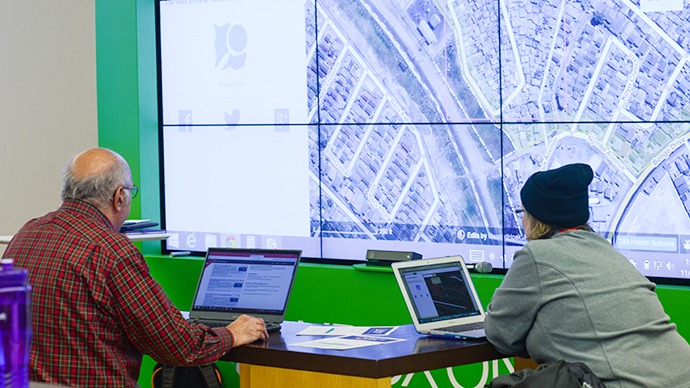
It’s safe to say that the world we live in today is full of global collaboration and innovative communication. This is especially relevant given that every day we are influenced by images of humanity (or crimes against humanity) that encourage us to reflect on how we, as individuals, fit into the greater context of society. It prompts us as global citizens to seek out how we can participate as humanitarians and connect in a cross-cultural context, while having a broader impact to affect positive change from our home here in the Pacific Northwest.
Continue Reading
February 2016 Newsletter
Posted on February 16, 2016.
Welcome to the February 2016 issue of the Global Washington newsletter.
IN THIS ISSUE
Letter from our Executive Director
As we approach International Women’s Day on March 8, we turn our attention to the issue of women’s empowerment and its undeniable link to sustained development. Gender inequality in its many forms does not impact women alone, rather it affects families, communities and entire societies. The Sustainable Development Goals are only achievable if we empower women globally, something that will be top of mind next month at United Nations (UN) Headquarters in New York when the UN gathers representatives of Member States with NGOs from around the world for the sixtieth session of the Commission on the Status of Women.
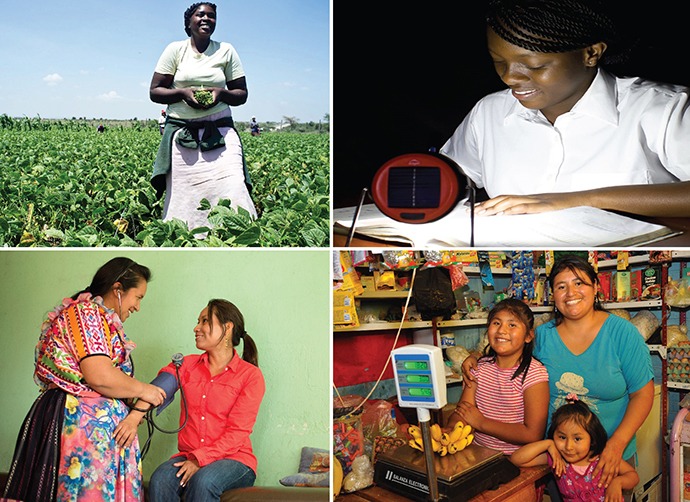
Photos: Global Partnerships
Many Global Washington members work tirelessly to improve women’s lives, and we’re highlighting a number of them in the articles below. I hope you will read on to learn about their current projects, success stories and plans for the future. These organizations are not only allowing women to realize their full potential, they are helping to create brighter futures for families everywhere.

Kristen Dailey
Executive Director
Back to Top
Question of the Month
 Does your organization have anything planned for International Women’s Day this year? If so, tell us who you are and what you have planned!
Does your organization have anything planned for International Women’s Day this year? If so, tell us who you are and what you have planned!
Please click here to respond.
Back to Top
Issue Brief
A Comprehensive Approach to Women’s Empowerment
By Tara Cookson
“There is no tool more effective for development than the empowerment of women.” – Kofi Anan
This quote is often cited in development circles, but what does it actually take to achieve women’s empowerment? A clear definition of what empowerment looks like can help guide work that’s both high-impact and sustainable.
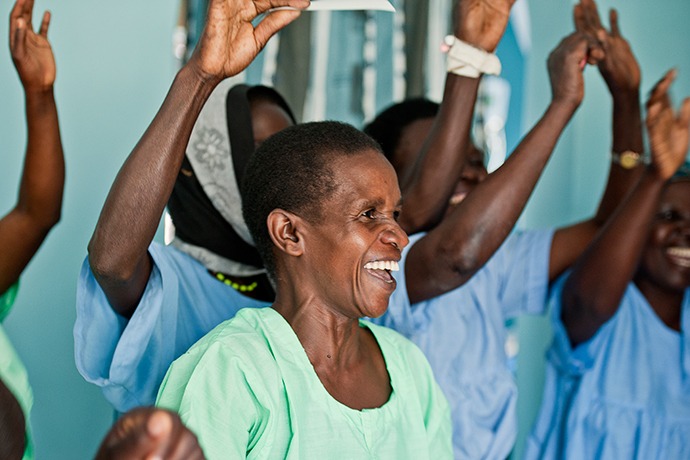
Photo: One By One
Defining Empowerment
Empowerment emerged as a fairly radical concept in development practice in the 1980s with the idea that there needed to be a transformation in the systems that assign women less power than men. Gender equity wouldn’t be achieved through women’s economic independence alone, many believed. Instead, there needed to be an overhaul of the political, economic, legal and social institutions and practices that drive inequality.
Take the case of Janina. Abandoned by her husband and now a single mother of four, Janina lives in the rugged Andean highlands. The nearest health clinic is three hours away by foot, and is often closed due to staff shortages. Janina is illiterate which makes it difficult to access public services, use the bank, and help her children with schoolwork. She lives with her children and brother, who is dependent upon her for care, on a small plot of arable land owned by her husband’s father. While her eldest children are in school, Janina secures her toddler to her back and tends to her crops, a task which in recent years has become more difficult due to persistent water shortages. If her father-in-law were to decide to sell the land, Janina’s future would be uncertain. While disempowerment takes many forms in Janina’s life, her case is far from unique.
Empowerment Today
Women’s empowerment and its link to sustainable development will be the guiding theme of the 60th session of the Commission on the Status of Women (CSW) taking place at the United Nations (UN) Headquarters in New York next month. The Sustainable Development Goals (SDGs) are only achievable if we make a “quantum leap” in women’s economic empowerment, according to UN Secretary General Ban Ki-moon. The CSW will host a first-of-its-kind high-level panel focusing specifically on women’s economic empowerment with the goal of providing thought leadership and mobilizing public and private actors to take concrete steps towards removing barriers to women’s economic participation.
The lasting impact of these meetings will largely depend on how empowerment is collectively defined, and how well stakeholders’ respective interventions are woven together as parts of a larger, transformative project.
Let’s return to the case of Janina. If economic empowerment is narrowly defined as simply earning an income, Janina cannot thrive. Cash alone won’t ensure that her health clinic will be open, that her children will receive a quality education, or that she’ll have access to clean water and electricity. Rather, Janina’s story portrays how diverse initiatives can play various roles in increasing women’s empowerment.
Future Directions for Empowerment
A transformative approach to women’s empowerment might look like a piece of cloth, with vertical interventions and horizontal, systems-level efforts woven tightly together. For example, access to safe and affordable family planning tools empower women and their partners to space births according to what they consider appropriate. Likewise, rural women gaining legal access to land provides food security and social status. Basic services like transportation allow women to access markets, and the availability of clean and affordable energy sources saves money and safeguards women’s health. Women’s ability to access financial services also depends on basic literacy – educating girls lays the foundation for future economic empowerment.
A number of Global Washington members work tirelessly to improve the lives of women, allowing them to look toward a brighter future for themselves and their families. Below are descriptions of just a few of these organizations, highlighting current projects. Learn more about these members and others on GlobalWA’s interactive map.
ACT for Congo: ACT for Congo empowers Congolese communities by providing critical support to local Congolese organizations that address the environment, education and health. They do not provide aid in the typical way. Instead, they facilitate. They connect their partners with resources and opportunities that would not be available to them if they did not have a U.S. partner advocating for them. ACT for Congo’s founding partner targets single teen and abandoned mothers in an integrated approach which includes disease prevention, vocational training, peer education and ongoing community support. www.actforcongo.org
Awamaki: Awamaki helps women’s associations in rural Peru start and run their own businesses selling artisan products. Volunteers teach product development, business and technical skills. They also help measure impact, collect stories and guide tourists to visit the artisan in their communities. Awamaki offers Peruvian women access to global markets and an improved quality of life in order to create sustainable development in their communities. www.awamaki.org
Bo M. Karlsson Foundation: Bo M. Karlsson Foundation (BMKF) empowers underprivileged women in Nepal through higher education. Since 2004, BMKF has awarded scholarships to 45 women students representing some of country’s most disadvantaged groups, including caste and ethnic minorities and women with disabilities. Several BMKF alumni rank among the first women in Nepal to work in their fields, including credit union manager Bhim Kumari ’14, electronics engineer Sarita Sharma ’14, medical doctor Sharada Chhetry ’13 and renewable energy expert Grishma Manandha ’11. www.bomkarlsson.com
Days for Girls International: Days for Girls International provides quality feminine hygiene products for girls by assembling and distributing feminine hygiene kits to areas in need. Girls around the world suffer indignities, infections and exploitation trying to stay in school without proper equipment for their menstrual needs. Days for Girls International works to ensure that every girl is safe and dignified with access to the proper information and supplies to stay healthy. www.daysforgirls.org
Global Partnerships: Global Partnerships (GP) is a nonprofit impact investor whose mission is to expand opportunity for people living in poverty. GP partners with organizations in Latin America, the Caribbean and Africa and helps them scale their work to reach millions of people living in poverty – the majority of whom are women. In the last 20 years, GP had helped 85 organizations deliver business loans to women entrepreneurs, essential medicines and health screenings to underserved women, solar lights to families living without electricity, and access to markets, technical assistance and financing to rural women farmers. www.globalpartnerships.org
Landesa: Landesa champions women’s land rights as a vital tool to address some of our world’s most persistent development challenges. Women with stronger rights to land experience increased participation in household decision making, which has a profound ripple effect on household nutrition, health, educational gains for children, and access to credit. Through innovative programs in Asia and Africa and the advocacy efforts of the Landesa Center for Women’s Land Rights, Landesa works to ensure that rural women have access to a transformative resource — secure rights to land. www.landesa.org
One By One: One By One partners with communities in Africa to provide life-transforming treatment for women and girls suffering with obstetric fistula, a devastating childbirth injury that causes uncontrollable leaking of urine and/or feces. Local teams carry out intensive rural outreach to educate about fistula and find women suffering in isolation. One By One covers the full cost of holistic treatment that restores a woman’s dignity and allows her to return to a productive life. One By One also works with communities to increase access to safe childbirth for all women. www.fightfistula.org
Planned Parenthood of the Great Northwest and the Hawaiian Islands (PPGNHI): Since 2001, PPGNHI’s Global Programs have improved the quality of sexual and reproductive health (SRH) services and education in Cameroon, the Dominican Republic (the DR), Ecuador, Laos, Nepal and Vietnam. Partneing with NGOs in the global south to positively impact the lives of women and families, PPGNHI currently focuses on improving youth SRH in the DR and Vietnam where the majority of clients are girls. Overall goals of PPGNHI’s global efforts include increasing access to family planning and other SRH services, empowering young people through education about SRH and rights, and reducing the incidence of unsafe abortion and its consequences. https://www.plannedparenthood.org/planned-parenthood-great-northwest-hawaiian-islands/international-programs
Spreeha Foundation: Spreeha strives to break the cycle of poverty for underprivileged people. Operating in the urban slums of Bangladesh, Spreeha focuses heavily on women’s health and empowerment. The young women leadership program caters to girls age 8 – 14, educating them about their rights and potential along with providing guidance and extracurricular skills training. The women empowerment and placement program provides professional and technical training to women age 15 – 45, and arranges for job placement once complete. Spreeha healthcare programs offer maternal care and family planning services, on top of wide-ranging medical support to its beneficiaries. www.spreeha.org
Thriive: Thriive provides pay-it-forward loans to ambitious entrepreneurs in developing countries (over half are women) to create jobs and strengthen vulnerable communities. Entrepreneurs repay this ThriiveCapital not in cash or profit, but by donating an equivalent value of staple products and job training to the poorest people in struggling communities. By paying their loans forward, Thriive entrepreneurs are inspiring new cultures of social responsibility and making vulnerable global communities more resilient and self-sufficient. Through providing women entrepreneurs with the affordable capital they need to expand their small businesses, Thriive helps lift more women out of poverty and builds shared prosperity worldwide. www.thriive.org
Back to Top
Featured Organization
Women’s Enterprises International
By Theresa Norris
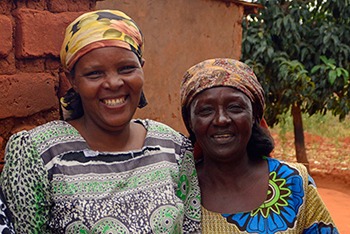 She went to bed alone, the night made even darker by her grief and fear. Grief from the death of her husband and fear from the uncertainty and hardship she faced as a widow with three small children. As she listened to the soft, steady breathing of her sleeping children, Julietah prayed to God to help her find a way to feed them for another day.
She went to bed alone, the night made even darker by her grief and fear. Grief from the death of her husband and fear from the uncertainty and hardship she faced as a widow with three small children. As she listened to the soft, steady breathing of her sleeping children, Julietah prayed to God to help her find a way to feed them for another day.
Julietah’s foremost concern, like mothers worldwide, was for her children. Mothers in rural Kenya and around the world come in a variety of forms; they are wives, mothers, widows, aunties, grandmothers, older sisters and caring women in the community. They are women who work and sacrifice for not only their own children, but also for others’ children. If you want to help children and families, help a mother.
Julietah is one of these mothers. She is a widow with 12 children now under her care. Shortly after her husband died, her brothers-in-law and their wives also died and all of their children came to live with her in the small mud/brick home that she shared with her three children. Julietah was consumed with worry for how she would provide for all the children. “I worry every day (about) what I’ll feed these children, and I worry that I don’t have water for them to drink or to use to wash so they can go to school,” she said. Then one day on her daily search for water, Julietah met Dorcas and things began to change.
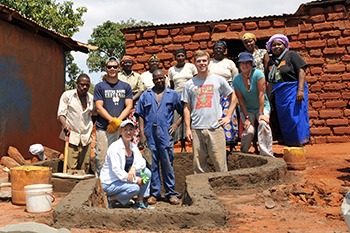 Dorcas was the leader of the newest women’s group started by Women’s Enterprises International (WEI) in Julietah’s home area of eastern Kenya. WEI empowers women to work together to improve the lives of their families and communities by facilitating the formation and training of women’s groups in rural Kenya. WEI provides grants that match the groups’ heard-earned savings to extend the impact of group projects in areas such as water, food security, solar power and education for orphans. WEI works to develop leaders and improve the quality of life for thousands in the region. And they know that when women work together, they can do amazing things.
Dorcas was the leader of the newest women’s group started by Women’s Enterprises International (WEI) in Julietah’s home area of eastern Kenya. WEI empowers women to work together to improve the lives of their families and communities by facilitating the formation and training of women’s groups in rural Kenya. WEI provides grants that match the groups’ heard-earned savings to extend the impact of group projects in areas such as water, food security, solar power and education for orphans. WEI works to develop leaders and improve the quality of life for thousands in the region. And they know that when women work together, they can do amazing things.
Dorcas, a widow herself, was moved by Julietah’s situation and invited her to join the WEI group of women who were working together to earn and save money to get clean water at each woman’s home. They, like Julietah, desperately needed water for drinking and cleaning. More importantly, they needed water to cook the dry maize and beans that are the staple food in the area.
Julietah joined the group and found herself surrounded by caring, supportive women who helped her carry her burden and learn new ways to earn income and save. When they could, the group also helped Julietah with school fees for her 12 children. After completing the first round of saving for their water project, the group had to decide who would receive the first 10,000-liter water tank. Continuing the WEI practice of distributing tanks to women with the greatest need, the group chose Julietah. They also selected her to receive one of the 15 concrete water tank bases that were constructed by a U.S. work team in August 2015.
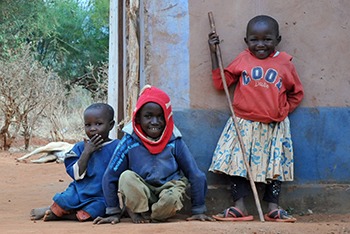 Julietah now has a giant 10,000-liter water tank installed in a solid concrete base and connected by a series of pipes and gutters to the roof of her home. After the first big rain, her tank was full of clean, fresh rain water that was harvested from her roof. Now that she has her own tank, her contributions to the group’s savings will be combined with funds from WEI in the U.S. to help other women in the group receive the blessing of clean water right outside their own front doors.
Julietah now has a giant 10,000-liter water tank installed in a solid concrete base and connected by a series of pipes and gutters to the roof of her home. After the first big rain, her tank was full of clean, fresh rain water that was harvested from her roof. Now that she has her own tank, her contributions to the group’s savings will be combined with funds from WEI in the U.S. to help other women in the group receive the blessing of clean water right outside their own front doors.
While Julietah’s responsibilities are still great, she no longer bears them alone. As a member of a WEI women’s group, she is working together with other mothers to improve the lives of their children and families. Julietah is the reason that WEI invests in women. By helping a mother, WEI empowers her to help everyone she touches.
Back to Top
Changemaker
Ndudi Chuku, Executive Director, Mission Africa
By Sara Atalla
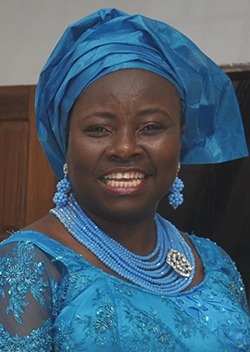 “Don’t forget us! Please, don’t forget us,” they pleaded as the car sped away en route to the airport. On that day in 1996, Ndudi Chuku was departing her Nigerian village for the United States — a mere 10 months after being married — leaving behind a husband, family and friends. Their pleas gave Chuku a feeling that she’ll never forget and that both haunts and inspires her to this day. “It motivates me daily as I continue to look for resources to help those I left behind.”
“Don’t forget us! Please, don’t forget us,” they pleaded as the car sped away en route to the airport. On that day in 1996, Ndudi Chuku was departing her Nigerian village for the United States — a mere 10 months after being married — leaving behind a husband, family and friends. Their pleas gave Chuku a feeling that she’ll never forget and that both haunts and inspires her to this day. “It motivates me daily as I continue to look for resources to help those I left behind.”
After seven years and 11 visa denials, Chuku’s husband George joined her in the U.S. Together they established Mission Africa in 2006 with a mandate to provide services that will have a positive, significant and lasting impact on the lives of the African people. The Auburn, Washington-based organization provides support in three core areas: education, health care and poverty alleviation. As Executive Director, Chuku uses the motivation that has stayed with her since first leaving home as she works in not only remote villages of Nigeria but also Tanzania, Uganda, Kenya, Rwanda, Sierra Leone, Ghana and Gambia. But Chuku’s dream of becoming a mobilizer and unifier began long before Mission Africa’s inception.
Though she witnessed extreme poverty, educational barriers, inhumane treatment and civil war growing up, Chuku describes her childhood and her close-knit family as happy. “We were certainly not rich. If we were poor, my parents made sure we didn’t notice,” she said. Her parents, who were well-respected in the community, worked hard to ensure their 11 children had access to a solid education. Her father, the only educated person in his family, started his career as a teacher and ended it after 33 years as an officer in the Nigerian Police Force. Her mother was a merchant who managed several roadside restaurants. Chuku credits her parents for her philanthropic heart, as she saw them help hundreds of people throughout their lifetimes.
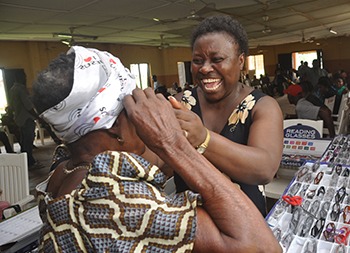 After establishing Mission Africa, Chuku served as a Program Assistant for the Bill & Melinda Gates Foundation, building strong relationships and support for the nonprofit she would eventually run full-time. “My time at the Gates Foundation fueled my passion and gave me the opportunity to make a tangible difference in millions of lives, simply by showing up at work every day,” said Chuku.
After establishing Mission Africa, Chuku served as a Program Assistant for the Bill & Melinda Gates Foundation, building strong relationships and support for the nonprofit she would eventually run full-time. “My time at the Gates Foundation fueled my passion and gave me the opportunity to make a tangible difference in millions of lives, simply by showing up at work every day,” said Chuku.
Making tangible differences in people’s lives didn’t end for Chuku when she left the Gates Foundation to focus her efforts on growing Mission Africa. Rather, it’s a theme that defines her life.
Ask Nwanne, a mother of four with no resources to sustain her roadside, second-hand clothing trade; she received a micro loan from Mission Africa last year and is now thriving with extra cash to care for her children and grandchildren. Ask Testimony, who lost both parents to HIV/AIDS and cancer and figured there was no hope of attending high school; she is thriving in school with the help of a Mission Africa scholarship. And there’s Joy, a Mission Africa scholarship graduate who grew up in a polygamous home where her mom was not the preferred wife — which means Joy was not a preferred child who would have the opportunity to attend school. A Mission Africa scholarship allowed Joy to graduate high school and attend college. Jean, another Mission Africa graduate, had few resources for her education after losing both parents at a young age. Jean is now in nursing school after successfully completing high school.
These four women are not alone. Chuku leads the Mission Africa team with a spirit that’s all-inclusive and contagious. Her proven devotion to what she calls “my African children” is exemplified in the organization’s numerous success stories.
Here are just a few accomplishments from Mission Africa’s current programs:
- Mission Africa’s academic scholarship program has allowed more than 300 students in rural villages in Nigeria, Tanzania, Kenya and Uganda to graduate high school and continue on to college or vocational training.
- Mission Africa has shipped 10 40-foot containers filled with books and school supplies to children and families in Nigeria, Kenya and Tanzania.
- Through Mission Africa’s medical clinics, 4,000 pairs of eyeglasses have been distributed to villagers in remote areas of eastern Nigeria. These and other free medical services have helped save and sustain thousands of lives and raise awareness about HIV/AIDS.
- Mission Africa acquired a piece of land in the Obosima village of Imo State, Nigeria, where the organization plans to build a hospital that will serve 350,000 people living in 18 villages.
Chuku has led efforts to build strategic partnerships with other nonprofits to better assist underprivileged families in Africa, specifically those living in small, rural villages. These partnership efforts have unified and empowered community leaders (chiefs) to increase their capacity and have strengthened their resolve to improve lives in the villages where Mission Africa offers programs and services. Detailed information on Mission Africa’s partner organizations can be found here.
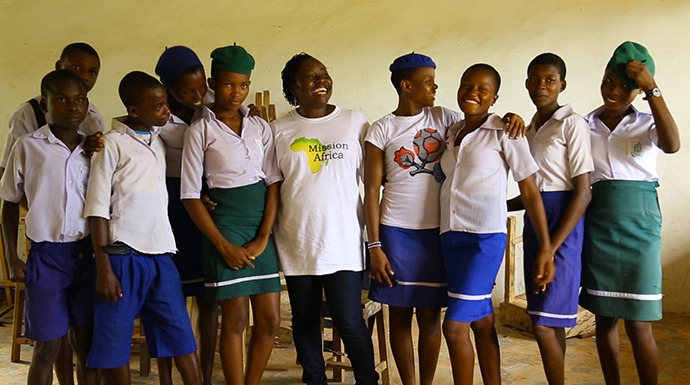 Chuku isn’t stopping anytime soon. She aims to build well-equipped hospitals and clinics that will provide continuity in health care for villagers, as well as schools and vocational training centers that will give village children equal educational opportunities. “The U.S. is a generous country, and I count it as a huge blessing that my family lives here in Washington state,” said Chuku. She attributes Mission Africa’s success to its generous donors and volunteers, and she has high hopes of growing the organization’s support in 2016.
Chuku isn’t stopping anytime soon. She aims to build well-equipped hospitals and clinics that will provide continuity in health care for villagers, as well as schools and vocational training centers that will give village children equal educational opportunities. “The U.S. is a generous country, and I count it as a huge blessing that my family lives here in Washington state,” said Chuku. She attributes Mission Africa’s success to its generous donors and volunteers, and she has high hopes of growing the organization’s support in 2016.
From her humble roots to inspirational leadership, carrying with her a passion for community service and a dedication to helping vulnerable communities and families worldwide, Chuku continues to chip away at the many obstacles she hopes to overcome. “Together, we are changing lives, one child at a time, one village at a time and one country at a time.”
Back to Top
Welcome New Members
Please welcome our newest Global Washington members. Take a moment to familiarize yourself with their work and consider opportunities for support and collaboration!
Tableau Foundation
The Tableau Foundation is made up of employees and partners of Tableau Software who care deeply about improving the world and believe data can unlock innovation and drive collaboration to help solve some of the world’s most pressing challenges. Their grants have spawned collaborations between Tableau employees, customers and partners as well as universities and other private and public institutions, and they have seen first-hand how data can drive the kind of innovation needed to move from alleviating the symptoms of the world’s problems to actually solving them. www.tableaufoundation.org
Back to Top
Member Events
Feb 17: World Affairs Council // YPIN Global Leader Dinner with Congressman Jim McDermott
Feb 18: Pangea Giving // Coffee + Chat
Feb 25: Shoreline Community College // Celebrating Food and Wellness around the World
Feb 27: NPH USA // Carnaval for a Cause Masquerade Party
Mar 18: Landesa // 10th Annual Seed the Change Luncheon
Back to Top
Career Center
Highlighted Positions
President/CEO – VillageReach
Executive Director – Snow Leopard Trust
Program Coordinator – FSG
For more jobs and resources, visit https://globalwa.org/resources/careers-in-development/
Back to Top
GlobalWA Events
February 25: Networking Happy Hour
March 1: Virtual Reality: Changing How We Engage in the World
March 22: Learn Tableau Software and Get Started With Your Own Data
Back to Top
Zika: Women Told to Delay Pregnancy, but Lack Reproductive Rights to Heed Call
Posted on February 8, 2016.
By Lisa Nikolau, Humanosphere
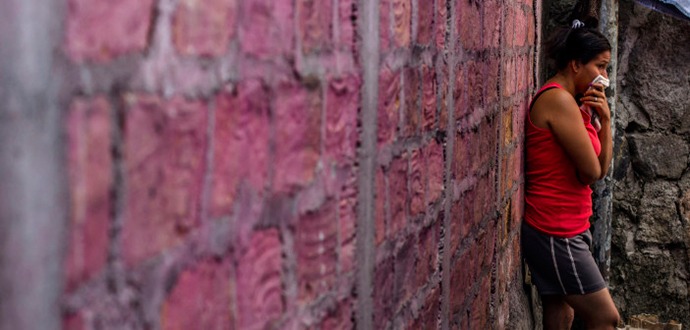
A woman covers her mouth outside her home while city workers fumigate to combat the Aedes Aegypti mosquitoes that transmit the Zika virus in El Salvador, Jan. 26, 2016. (AP Photo/Salvador Melendez)
In response to the recent outbreak of the Zika virus throughout Latin America, health officials in El Salvador have urged women not to get pregnant until 2018 in an effort to combat an increase in a birth defect known as microcephaly, which is suspected to be caused by the mosquito-borne illness.
“We’d like to suggest to all the women of fertile age that they take steps to plan their pregnancies, and avoid getting pregnant between this year and next,” said El Salvador’s Deputy Health Minister Eduardo Espinoza.
Click here to read more on Humanosphere.
Ending Preventable Stillbirths – The Next Frontier in Maternal Infant Child Health
Posted on February 1, 2016.
by Debbie Lester, Clinical Programmes and USA Country Director, Adara Development
 As a lucky mother of three beautiful kids, I can tell you that there are few joys that compare with the birth of a baby. Across the globe, bringing new life into the world is celebrated; parents wait with excitement and anticipation, and those first moments of life are truly extraordinary.
As a lucky mother of three beautiful kids, I can tell you that there are few joys that compare with the birth of a baby. Across the globe, bringing new life into the world is celebrated; parents wait with excitement and anticipation, and those first moments of life are truly extraordinary.
But as a clinician who has spent many years in delivery rooms, I can tell you that there are few sorrows that compare with the loss and devastation faced by parents, families, healthcare providers and communities when a baby is born stillborn.
Continue Reading
Women’s Justice Initiative Addresses Gender Inequality and Violence
Posted on January 18, 2016.
By Pangea Giving
The municipality of Patzun in the Chimaltenango district of Guatemala is not unique. Like other regions of Guatemala it’s a highly patriarchal society and gender inequality is entrenched in the culture. The United Nations estimates close to 45% of Guatemala women are victims of gender- based violence and it’s even higher among rural indigenous women due to social isolation and limited access to resources.
Continue Reading
Securing Women’s Land Rights Can Help With Climate Change
Posted on January 4, 2016.
By Ranjana Das and Tzili Mor, Landesa
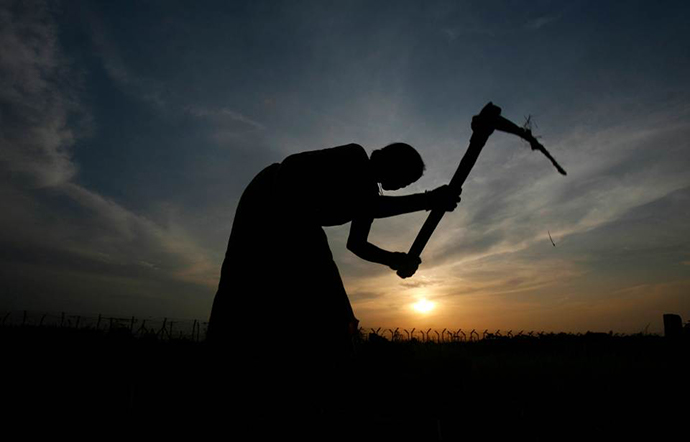
A farmer working in a paddy field is silhouetted against the setting sun on the outskirts of Agartala, capital of India’s northeastern state of Tripura August 9, 2010. REUTERS/Jayanta Dey
As world leaders convene in Paris this week for the 2015 UN Climate Change Conference, it is important that they recognize secure land rights for smallholder farmers – and especially for women farmers – as a critical tool for building a more sustainable planet.
It is increasingly understood that climate change is far from gender neutral. In fact, hotter temperatures, erratic rainfall, and worsening natural disasters ravage rural women in general and women small-scale farmers in particular. They must travel further for water and firewood, struggle with drought-stricken yields, grapple with disaster reduction and recovery efforts that fail to account for their interests and needs, and shoulder increased domestic workload related to climate change.
Continue Reading
Sustainable Health Solutions for People Living in Poverty in Latin America
Posted on December 19, 2015.
A case study by Global Partnerships
It is estimated that 1.3 billion people worldwide have no access to quality, affordable health services. Despite government resources spent on health services, individuals continue to bear most of the burden of health services costs, a reality that hits the poor the hardest. To improve access to healthcare for the poor at this large of a scale, we need to explore financially sustainable models. In 2012, Global Washington member Global Partnerships launched the Health Services Initiative to test out market-based health solutions.
DOWNLOAD THE FULL REPORT
COP 21 Dispatch: The final Paris agreement
Posted on December 14, 2015.
By Heather Coleman, Oxfam America
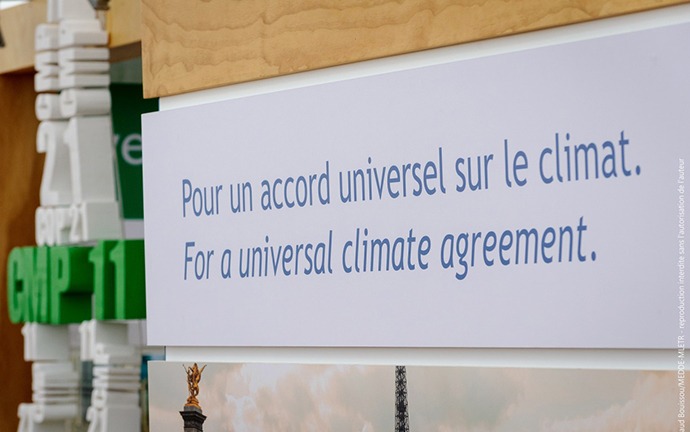
Global climate negotiations begin in France on Sunday. Photo: http://bit.ly/1T4UMN8
A few top-line comments on the agreement coming out of COP21
We have been waiting for the world to act and today, more than 190 countries — including the US, have come together to do just that. Having been part of the climate movement for most of my professional life, it will be a moment I will not forget. It’s hard to overstate how important and historic a moment this is, with the US at the center of a global agreement that addresses one of the greatest challenges of our time.
Continue Reading
It Takes a Village
Posted on November 30, 2015.
By Kaitlin Marshall
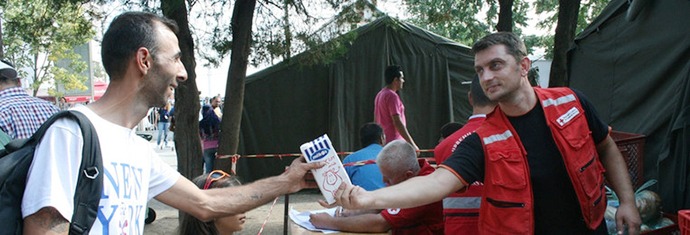
American Red Cross
Since 2011, the situation in Syria has escalated from a series of peaceful demonstrations to civil war. Nationwide protests against President Bashar Al-Assad were met with violent crackdowns at the hands of the government and the Syrian army. In January 2015, the death toll surpassed 220,000 and has since been estimated to be as high as 310,000. As Syria has plunged further into violence, the country’s infrastructure has been left in ruins. More than 11 million Syrian refugees have fled their homes to find safety abroad. What began as an isolated conflict in one country is now a crisis that requires the world to come together to give displaced Syrians a new beginning.
Continue Reading
November 2015 Newsletter
Posted on November 17, 2015.
Welcome to the November 2015 issue of the Global Washington newsletter.
IN THIS ISSUE
Letter from our Executive Director
The word “disruptive” is often used to describe new technologies or services that can change our lives. Washington state has a rich history in disruptive businesses — Boeing, Microsoft, Amazon and Starbucks, to name a few. Disruptive innovation seems to be in our DNA here in the Pacific Northwest, and it also influences how we tackle the world’s most complex challenges, from malaria to income inequality.
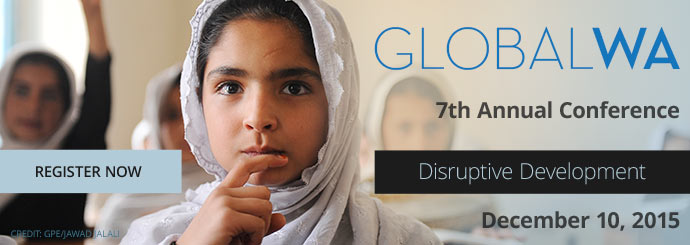 We call this “Disruptive Development,” meaning solutions that have a transformational impact on a society to improve lives, and it is the theme of the 2015 Global Washington Conference on December 10. We will examine trends in international development and spotlight some of the most disruptive interventions. Non-profit and for-profit organizations such as Mercy Corps, PATH, Global Good and PwC will discuss breakthrough technologies and approaches. Disruptive grantmakers from the Gates Foundation, Lemelson Foundation and Tableau Foundation will present new models of philanthropy that aim to advance inventions.
We call this “Disruptive Development,” meaning solutions that have a transformational impact on a society to improve lives, and it is the theme of the 2015 Global Washington Conference on December 10. We will examine trends in international development and spotlight some of the most disruptive interventions. Non-profit and for-profit organizations such as Mercy Corps, PATH, Global Good and PwC will discuss breakthrough technologies and approaches. Disruptive grantmakers from the Gates Foundation, Lemelson Foundation and Tableau Foundation will present new models of philanthropy that aim to advance inventions.
I hope you will join us to add your voice to the conversation. Below you can read more from our keynote speakers, and you can learn more about the conference here.
See you on December 10th!

Kristen Dailey
Executive Director
Back to Top
Question of the Month

Have you seen the agenda for our annual conference on December 10? What session and/or speaker are you most excited about?
Please click here to respond.
Back to Top
Featured Speaker
Social Entrepreneurs: Our R&D for a Beyond Better World
By Sally Osberg
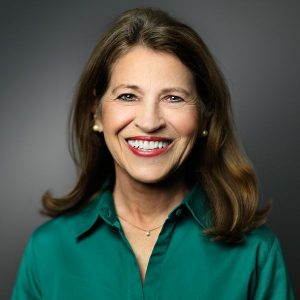 The quintessentially human drive to set things right is what propels change and gets us beyond better, bringing an end to injustice, conflict, and poverty. How? By imagining a far fairer and better world and deeply understanding the problem before developing a solution.
The quintessentially human drive to set things right is what propels change and gets us beyond better, bringing an end to injustice, conflict, and poverty. How? By imagining a far fairer and better world and deeply understanding the problem before developing a solution.
Andrea and Barry Coleman couldn’t forget what they saw during a trip to Somalia in 1986: hemorrhaging patients being carted to clinics in wheelbarrows, while abandoned and rusting vehicles littered the roadsides.
This signaled to the Colemans a health care delivery system in deep disarray. It wasn’t simply the medical supplies that were lacking—vaccines, for example, or bed nets—but the vehicle mechanics and maintenance protocols required to transport those essential supplies to patients, often in remote areas.
Andrea was a former motorcycle racer and Barry a journalist who covered the sport. With their expertise, the Colemans knew what it would take to build an effective health care transport system for Africa’s rugged roads and terrain. Driven by the conviction that such a system could actually be achieved, they created Riders for Health.
From food insecurity to lack of access to health care to growing environmental threats—if we’re going to solve the world’s most pressing problems, we need social entrepreneurs like the Colemans every bit as much as we need great institutions and great global leaders.
Working on the front lines, social entrepreneurs fight disease, poverty, and injustice with their innovative approaches. They are proof that health care can be delivered efficiently and equitably; that sustainability not only trumps resource depletion, but makes for better business in the long run; and that we’re all in this together.
We need these change-makers; we need their agency—the creativity, discipline, and drive they bring to challenges confronting humanity and the planet. But what is it that makes them so distinctive and so indispensable?
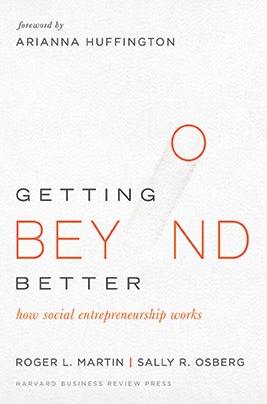 First, they are entrepreneurs. Like their counterparts in the business world, social entrepreneurs are determined to drive change with their innovative ideas. Both aim to disrupt a status quo they see as sub-optimal. For the business entrepreneur, this might be a product or service that doesn’t work well, but is the only option on the market. Social entrepreneurs, however, aren’t just concerned with inconvenience or inefficiency; they target problems that cause outright harm, especially for poor and marginalized populations.
First, they are entrepreneurs. Like their counterparts in the business world, social entrepreneurs are determined to drive change with their innovative ideas. Both aim to disrupt a status quo they see as sub-optimal. For the business entrepreneur, this might be a product or service that doesn’t work well, but is the only option on the market. Social entrepreneurs, however, aren’t just concerned with inconvenience or inefficiency; they target problems that cause outright harm, especially for poor and marginalized populations.
Andrea and Barry Coleman didn’t want to put new vehicles on the road just to improve the way medical supplies were transported. Instead they aimed to permanently change the health care delivery system across the developing world—providing reliable health transport by placing vehicles on preventative maintenance schedules, eliminating breakdowns, reducing costs, and improving efficiency.
Within every social entrepreneur is an unwavering belief that big, seemingly intractable problems offer unsurpassed opportunities for change. Instead of cursing the darkness, social entrepreneurs shine a light of possibility that shows how even our toughest problems can be solved. The Skoll Foundation provides support for many of these change-makers, and we’re proud to count ourselves as their partners.
Strategy guru Roger Martin and I explore learnings from Riders for Health and other world-changing social entrepreneurs in our new book, Getting Beyond Better: How Social Entrepreneurship Works. Their stories, their approaches, and their impact on the world deserve to be better known and understood so that business, government, and citizens the world over can join them in creating a far better and fairer future for everyone.
Back to Top
Featured Speaker
The Most Important To-Do List for 2015
By Mark Suzman
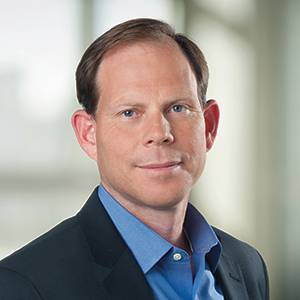 The saying goes that if you have too many priorities, you actually have none at all. I wholeheartedly agree, even if I’m not always able to practice this with my own daily to-do list.
The saying goes that if you have too many priorities, you actually have none at all. I wholeheartedly agree, even if I’m not always able to practice this with my own daily to-do list.
The same principle holds true when taking on complex issues at an international scale. At the Gates Foundation — where I lead our work in policy and advocacy — we are big supporters of targeted efforts to tackle the problems at the root of human suffering.
In the coming months, all eyes will be on global leaders as they finalize a new global development agenda — the Sustainable Development Goals (SDGs) — that aims to do just that. This effort builds on the remarkable progress the world has made since the predecessor Millennium Development Goals (MDGs) put forward a shared vision in 2000 of where we wanted the world to be in 2015.
We support the bold vision of the SDGs, which is consistent with the “big bet” that Bill and Melinda Gates laid out in their annual letter last January. By focusing on the most urgent global health and development challenges, Bill and Melinda predicted that “the lives of people in poor countries will improve faster in the next 15 years than at any other time in history.”
As progress on the current MDGs has demonstrated, the world community is capable of taking on big challenges. The MDGs included just eight goals, which helped focus the world’s attention on the most urgent problems — extreme poverty, deaths from preventable causes, gender inequality, and lack of access to education for children everywhere.
These ambitious but achievable goals — with measurable, time-bound results — were the glue that bound together national and donor governments, donors and international development agencies, civil society, and the private sector. By establishing universal alignment around a shared set of clear and resonant objectives, the MDGs galvanized financial support and ensured that everyone was pulling from the same end of the rope
In significant part because of these unified efforts, extreme poverty, hunger, and child mortality have all been cut in half since 1990, with much deeper progress in many individual countries across Africa, Asia and Latin America.
But it’s critical that the global community stay focused on these urgent and largely preventable problems. Nearly 7 million children under age 5 are still dying every year, many from preventable causes. Hundreds of millions of children are still chronically undernourished. And millions more people are dying needlessly every year from preventable infectious diseases.
There is unanimous agreement that we must finish the job on the world’s big challenges. The recently-published “zero draft” of the SDG framework underscored this, stating that “poverty eradication is our greatest global challenge.” To be sure, there are many perspectives on how we accomplish this.
The MDGs consisted of eight goals, supported by 21 quantifiable and time-bound targets. As the SDGs have taken shape, there are 17 goals and 169 targets. At one level, this expansion represents a welcome and overdue democratization of the goal setting process — reflecting a comprehensive set of aspirations in areas from fisheries and forest management to job creation to violence against women. At another level, however, the range of targets pose an inevitable challenge in terms of prioritization and focus: no country is going to be able to treat all of them with equal urgency.
We believe it is important to embrace and celebrate the broad framework and spirit of the global goals — in a way that ordinary citizens can understand and and use to hold their governments accountable for implementation. To that end, we actively support a number of efforts — such as action/2015, Global Citizen, and Project Everyone — to elevate awareness about the importance of the new global development agenda. And we support coalitions promoting the SDGs in more than 60 developing countries.
At the same time, given our own priorities and experience as a foundation and the mandate from our founders to focus on the needs of the poorest, our focus and resource investments after September will in large part continue to focus on the “unfinished agenda” of the current MDGs. Nearly all governments have affirmed that this is an important and shared priority. To sustain and build on the huge momentum of the past 15 years, there are a series of actions that we believe need to be addressed in coming months:
· Focus on the most impactful targets. It’s important that the global community agree on what targets we need to focus on to cut maternal, child, and newborn deaths by two-thirds by 2030.
· Agree on a basic “social compact.” Recognizing the long-term benefits of investing in development, rich and poor countries must come to a consensus that investing in development — maternal and child health, family planning, nutrition, infectious diseases, agricultural development, education and sanitation — is a shared responsibility between donors, developing countries and the private sector.
· Bring more ambition to financing development: At the upcoming Third International Conference on Financing for Development in Addis Ababa, finance ministers from rich and poor countries must identify the necessary financing sources and policies — including the right mix of increased and appropriately targeted donor aid, increased domestic resources from developing countries, and a greater role for the private sector that enable us to lay the conditions for inclusive growth and eradicate extreme poverty.
· Protecting the poorest in middle-income countries. As more countries like Pakistan, Ghana and Nigeria transition to middle income status as measured by per capita GDP, but still retain very large pockets of deep poverty, we must ensure that we don’t leave large gaps in financing for basic services that are at the heart of our health and development efforts.
· Optimizing natural resources. As African countries reduce their dependence on aid from wealthy countries, we must support their efforts to maximize income from natural resources for human development priorities.
If the world comes together — as it did 15 years ago — around a shared set of global goals for sustainable development , I’m optimistic that we will see the lives of millions of people improve faster in the next 15 years than at any other time in history. This is why we are enthusiastic about the SDGs. Well-intentioned people may disagree about how best to prioritize the goals and targets, but we all can agree that the SDGs are the foundation upon which wealthy and poor countries alike can work together to achieve a more just world for everyone.
Back to Top
Featured Speaker
Agenda For Women
By Kiran Bedi
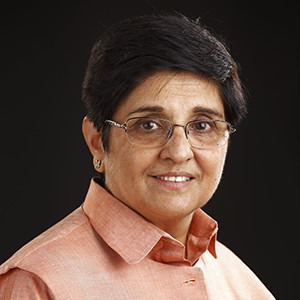 Just a few days ago, we organized convocation upon the successful completion of a vocational course for women in the villages of Haryana.
Just a few days ago, we organized convocation upon the successful completion of a vocational course for women in the villages of Haryana.
It was sheer joy hearing the beneficiaries of the course recount what they had done since they had become skilled. Each was self-confident and financially almost self-reliant; and in many cases, even supporting the family financially and running the home. Many had put their children in better schools, started small businesses, saved some money, and earned a great deal of confidence.
They recalled how it all started.
They shared with us how they dared to venture out of home, stealthily in most cases. They would switch off their mobile phones so that their husbands did not get to know they had come for training, as one of them narrated. She would tell her husband that the device had run out of battery and there was no way to recharge it, as the village had no electricity.
The same woman said that her husband would not allow her to even leave home, while he himself was posted outside the city, and after his death, the skill of stitching and tailoring that she had learnt now had come to her rescue. She now was the family’s lone breadwinner, sending her two children to school, and looking after her ailing mother-in-law.
Learning to step out
She now runs a small shop to sell designer garments, employs other women, and trains them free of cost. Before this convocation, the students had been asked to present whatever cultural programme they liked. They presented a small skit. They scripted it and acted it out. It showed a family where the daughter was not allowed to step out of the house but told to stick to cooking and cleaning. One day, an NGO worker visits the family and asks the girl how she spends her day.
The girl says she does nothing much.
The social worker invites her to learn how to stitch, tailor, and design clothes. She says she cannot until her father allows her.
The social worker approaches her father, and sure enough, he declines to give her permission, saying his honour would be hurt if he allowed his daughter to step out of the house. When the social worker goes into the merits of the daughter’s being skilled and ensures her father that no way the family honour would be hurt, he relents. This was based on a true story, but not all stories end this way.
The play was written and enacted by the women of the village. It reveals what is still the general condition, with some emerging exceptions no doubt but few and far between. It exposes the huge restrictions that girls and many women of today are living under. They are still being held back, even when an opportunity to learn is next door. Imagine how it must be when the opportunities are far.
The most harmless domestic animal
What do we do? How can India moves forward fast enough, if fathers, husbands and brothers continue to be so closed-minded, insecure, and selfish? It hurts me to see girls held back in 2015 only because of gender, place and lack of opportunities; opportunities that many of us got decades ago.
I am reminded of a story I read long ago. Titled “The Most Harmless Domestic Animal”, here’s how it goes in the words of a daughter: “When I breathed for the first time, you told my father: ‘Start saving, it’s a girl.’ At 5, you told me, learn to read and write, so that a boy will come for you. At 10, you told me: ‘Save yourself, you are a girl.’ At 15, you told me stay home, learn to cook, wash, and remain silent and obedient. At 20, you told me don’t come back to us. Years went on and I kept my promise, nobody ever had a complaint. I was the most harmless domestic animal man ever had in history.”
Collective effort required
Girls are products of home and school. Both nurture her. What if she is deprived of these, of if none lays the foundation for her growth?
We have a duty, each one of us here, to make individual and collective effort to give our new generation of girls easy, secure and assured access to opportunities for a robust India. We need to create measurable systems where the local administration with the help of people’s representatives takes on the challenge to address these social issues at every level starting from panchayat, to reach out through dialogue. Credible NGOs at the grassroots, working with women in rural areas, need to be co-opted. Only then will I say that our India is inclusive society, the India of our dreams
Back to Top
Welcome New Members
Please welcome our newest Global Washington members. Take a moment to familiarize yourself with their work and consider opportunities for support and collaboration!
American Red Cross
The American Red Cross Northwest Region brings together local volunteers to care for neighbors, trains hundreds of thousands of people each year in life-saving skills, and responds to a local disaster almost daily. With offices located throughout the state, they serve the people, businesses and communities of Washington and the Idaho Panhandle. The ARC Northwest Region chapter is part of a larger organization which provides emergency relief services around the world. redcross.org/local/wa/northwestregion
AmeriCares
AmeriCares is an emergency response and global health organization committed to saving lives and building healthier futures for people in crisis in the United States and around the world. americares.org
Camber Collective
Camber Collective is a strategy consulting firm that helps organizations navigate complex change and achieve high performance against both financial and mission-related goals. It believes strategies rooted in a deep understanding of people and communities are most likely to enable organizations to thrive. cambercollective.com
Health & Hope Foundation
Health and Hope Foundation is a team of passionate volunteers from varied walks of life who share the desire to embrace other cultures, create meaningful connections, and affect lasting contributions which help break the cycle of poverty in the developing world. healthandhopefoundation.org
Back to Top
Member Events
Nov 18: Shoreline Community College // Cambodia: A Country of Contradictions
Nov 19: Oikocredit Northwest // Microfinance and Microbrews
Nov 20: Upaya Social Ventures // Bollywood Diwali Party
Nov 20: Seattle Metropolitan Chamber of Commerce // Toast of Seattle
Dec 3: Washington Biotechnology & Biomedical Association // Digital Health and the Influence on Healthcare: Wearables, Telehealth, & Treatment
Back to Top
Career Center
Highlighted Positions
Investment Analysis Officer – Global Partnerships
Country Director, Various Locations – Mercy Corps
Operations and Development Associate – One by One
For more jobs and resources, visit https://globalwa.org/resources/careers-in-development/
Back to Top
GlobalWA Events
November 19: Networking Happy Hour
December 10: GlobalWA 7th Annual Conference
Back to Top




 She went to bed alone, the night made even darker by her grief and fear. Grief from the death of her husband and fear from the uncertainty and hardship she faced as a widow with three small children. As she listened to the soft, steady breathing of her sleeping children, Julietah prayed to God to help her find a way to feed them for another day.
She went to bed alone, the night made even darker by her grief and fear. Grief from the death of her husband and fear from the uncertainty and hardship she faced as a widow with three small children. As she listened to the soft, steady breathing of her sleeping children, Julietah prayed to God to help her find a way to feed them for another day. Dorcas was the leader of the newest women’s group started by
Dorcas was the leader of the newest women’s group started by  Julietah now has a giant 10,000-liter water tank installed in a solid concrete base and connected by a series of pipes and gutters to the roof of her home. After the first big rain, her tank was full of clean, fresh rain water that was harvested from her roof. Now that she has her own tank, her contributions to the group’s savings will be combined with funds from WEI in the U.S. to help other women in the group receive the blessing of clean water right outside their own front doors.
Julietah now has a giant 10,000-liter water tank installed in a solid concrete base and connected by a series of pipes and gutters to the roof of her home. After the first big rain, her tank was full of clean, fresh rain water that was harvested from her roof. Now that she has her own tank, her contributions to the group’s savings will be combined with funds from WEI in the U.S. to help other women in the group receive the blessing of clean water right outside their own front doors. “Don’t forget us! Please, don’t forget us,” they pleaded as the car sped away en route to the airport. On that day in 1996, Ndudi Chuku was departing her Nigerian village for the United States — a mere 10 months after being married — leaving behind a husband, family and friends. Their pleas gave Chuku a feeling that she’ll never forget and that both haunts and inspires her to this day. “It motivates me daily as I continue to look for resources to help those I left behind.”
“Don’t forget us! Please, don’t forget us,” they pleaded as the car sped away en route to the airport. On that day in 1996, Ndudi Chuku was departing her Nigerian village for the United States — a mere 10 months after being married — leaving behind a husband, family and friends. Their pleas gave Chuku a feeling that she’ll never forget and that both haunts and inspires her to this day. “It motivates me daily as I continue to look for resources to help those I left behind.” After establishing Mission Africa, Chuku served as a Program Assistant for the Bill & Melinda Gates Foundation, building strong relationships and support for the nonprofit she would eventually run full-time. “My time at the Gates Foundation fueled my passion and gave me the opportunity to make a tangible difference in millions of lives, simply by showing up at work every day,” said Chuku.
After establishing Mission Africa, Chuku served as a Program Assistant for the Bill & Melinda Gates Foundation, building strong relationships and support for the nonprofit she would eventually run full-time. “My time at the Gates Foundation fueled my passion and gave me the opportunity to make a tangible difference in millions of lives, simply by showing up at work every day,” said Chuku. Chuku isn’t stopping anytime soon. She aims to build well-equipped hospitals and clinics that will provide continuity in health care for villagers, as well as schools and vocational training centers that will give village children equal educational opportunities. “The U.S. is a generous country, and I count it as a huge blessing that my family lives here in Washington state,” said Chuku. She attributes Mission Africa’s success to its generous donors and volunteers, and she has high hopes of
Chuku isn’t stopping anytime soon. She aims to build well-equipped hospitals and clinics that will provide continuity in health care for villagers, as well as schools and vocational training centers that will give village children equal educational opportunities. “The U.S. is a generous country, and I count it as a huge blessing that my family lives here in Washington state,” said Chuku. She attributes Mission Africa’s success to its generous donors and volunteers, and she has high hopes of 
 As a lucky mother of three beautiful kids, I can tell you that there are few joys that compare with the birth of a baby. Across the globe, bringing new life into the world is celebrated; parents wait with excitement and anticipation, and those first moments of life are truly extraordinary.
As a lucky mother of three beautiful kids, I can tell you that there are few joys that compare with the birth of a baby. Across the globe, bringing new life into the world is celebrated; parents wait with excitement and anticipation, and those first moments of life are truly extraordinary.



 The quintessentially human drive to set things right is what propels change and gets us beyond better, bringing an end to injustice, conflict, and poverty. How? By imagining a far fairer and better world and deeply understanding the problem before developing a solution.
The quintessentially human drive to set things right is what propels change and gets us beyond better, bringing an end to injustice, conflict, and poverty. How? By imagining a far fairer and better world and deeply understanding the problem before developing a solution. First, they are entrepreneurs. Like their counterparts in the business world, social entrepreneurs are determined to drive change with their innovative ideas. Both aim to disrupt a status quo they see as sub-optimal. For the business entrepreneur, this might be a product or service that doesn’t work well, but is the only option on the market. Social entrepreneurs, however, aren’t just concerned with inconvenience or inefficiency; they target problems that cause outright harm, especially for poor and marginalized populations.
First, they are entrepreneurs. Like their counterparts in the business world, social entrepreneurs are determined to drive change with their innovative ideas. Both aim to disrupt a status quo they see as sub-optimal. For the business entrepreneur, this might be a product or service that doesn’t work well, but is the only option on the market. Social entrepreneurs, however, aren’t just concerned with inconvenience or inefficiency; they target problems that cause outright harm, especially for poor and marginalized populations. The saying goes that if you have too many priorities, you actually have none at all. I wholeheartedly agree, even if I’m not always able to practice this with my own daily to-do list.
The saying goes that if you have too many priorities, you actually have none at all. I wholeheartedly agree, even if I’m not always able to practice this with my own daily to-do list. Just a few days ago, we organized convocation upon the successful completion of a vocational course for women in the villages of Haryana.
Just a few days ago, we organized convocation upon the successful completion of a vocational course for women in the villages of Haryana.